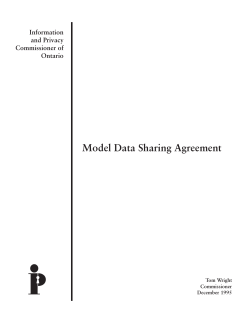
How to register and make a relevant representation Advice note 8.3:
How to register and make a relevant representation Advice note 8.3: Putting your case to the IPC Introduction This advice note has been prepared to help people who are affected by a major infrastructure proposal, where an application for development consent has been submitted to the Infrastructure Planning Commission (IPC) and accepted to proceed to examination. It explains how people can register to put their case on the application and make a relevant representation giving their views of the application. The IPC is the impartial public body that considers whether permission should be given to developers to proceed with building major infrastructure projects, such as new harbours, power stations, railways, roads, airports, electric lines, wind farms and reservoirs. We consider a developer’s application by looking at all the relevant information, including Government policy, environmental issues, local impact and the views of the public, in order to judge whether or not a development should be allowed to go ahead. Putting your case to the IPC - How to register and make a relevant representation February 2011 When can I make my case to the IPC? This advice note applies only from the point at which an application for development consent has been submitted and we have accepted it to proceed to IPC examination. Prior to an application being submitted or accepted by the IPC, any views regarding a proposal should be directed in the first instance to the developer. Please see IPC Advice Notes 8.1: How the process works - opportunities to be involved and 8.2: How to have your say on a major infrastructure proposal - the developer’s consultation. How do I put my case to the IPC? If you would like to put your case to the IPC Commissioner(s) about a major infrastructure application that has been accepted to proceed to examination, you first need to register with us. Once you have registered, you will have the opportunity to take part in the examination process and be kept up to date with its progress. Registering will enable you to: • Put a summary of your case to the IPC in writing (known as making a relevant representation) • Request to speak at the Preliminary Meeting about how the application should be examined How do I register? You can register with the IPC online or by completing a paper version of the registration form. Registering provides the IPC with your contact details so that we can stay in touch with you through the examination process. Any identifying information, apart from your name, will be removed from your representation before it is published at our website. When you register you must include a summary of the key issues you want the IPC to focus on. There will also be an opportunity to provide a more detailed statement at the examination stage provided that you register at this stage. There is guidance included with the registration form to help you to make a valid representation. You should read these notes carefully and ensure that you complete all sections of the form. Your representation should not concern the merits of designated National Policy Statements produced by Government which provide the framework for our decisions. Your representation should focus upon the impact of a proposal, or the issue or information to which you wish to draw the Commissioner(s) attention. • Provide a more detailed written representation to the IPC • Request that a hearing be held • Request to speak at a hearing. 02 Putting your case to the IPC - How to register and make a relevant representation February 2011 When should I register? You cannot register before an application has been submitted to the IPC. The opportunity to register and put your case to the IPC on a proposal arises only after we have received an application and accepted it to proceed to examination and the developer has publicised the acceptance. Registration is time-limited. You will always be given at least 28 days to register to have your say on a project, and a deadline will be set and made public, giving the date on which the registration period will close. The developer will publicise the fact that an application has been accepted by the IPC for examination. They must include notices in a local newspaper and a national newspaper, as well as close to the site of the proposed development. The developer may also choose to notify you in other ways, for example, through their own project website. What happens next? After the end of the registration period, copies of all representations will be published at the IPC website. All identifying personal information, other than your name, will be removed from your representation by the IPC prior to publication. You can view representations online and printed copies will also be made available locally. People who have successfully registered will then be invited to attend and take part in the Preliminary Meeting. At the meeting, or shortly after, the IPC Commissioner(s) will decide how the examination will be run and set the timetable for the examination. Please see Advice Note 8.4: ‘How an application will be examined by the IPC - The Preliminary Meeting’ and Advice Note 8.5 Putting your case to the IPC - the Examination Process’ for more information about this. You must register separately for each application on which you wish to put your case to the IPC. You can do this online at: www.independent.gov.uk/infrastructure You can also request a copy of the registration form from our helpline on: 0303 444 5000. 03 Putting your case to the IPC - How to register and make a relevant representation February 2011 Independent Planning Advice Planning Aid England provides free, independent and professional planning advice to individuals and communities who cannot afford to pay professional fees. To find out if you are eligible for their services, contact them by telephone on: 0121 214 2915 or email: enquiries@planningaid.rtpi.org.uk Planning Aid Wales offers a free helpline service to assist ‘eligible’ members of the public and community groups needing help with a planning matter. To find out if you are eligible visit: www.planningaidwales.org. uk/how-paw-can-help/advice or telephone: 02920 625000 (helpline operates from: 10.00am to 1.30pm - Monday to Friday). For those people or organisations who do not qualify for Planning Aid, the Royal Town Planning Institute (RTPI) publishes a list of planning consultants who can provide professional advice. You should seek a consultant who has specialist expertise in major infrastructure projects and the Planning Act 2008. Visit: www.rtpi.org.uk Further information The Infrastructure Planning Commission, Temple Quay House, Temple Quay, Bristol BS1 6PN Email: ipcenquiries@infrastructure.gsi.gov.uk Telephone: 0303 444 5000 Web: www.independent.gov.uk/infrastructure 04 Putting your case to the IPC - How to register and make a relevant representation February 2011
© Copyright 2025





















